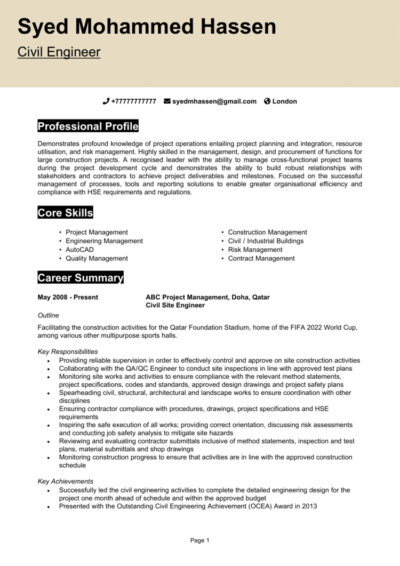Are you ready to build the foundations for your next big career move?
As a Civil Engineer, your expertise in planning and overseeing construction projects is in high demand. But before you can construct that next project, you’ll need a CV that stands tall and gets noticed.
This guide, complete with Civil Engineer CV examples, will help you craft an application that showcases your technical skills, project experience, and ability to keep everything structurally sound – just like your designs.
Civil Engineer CV
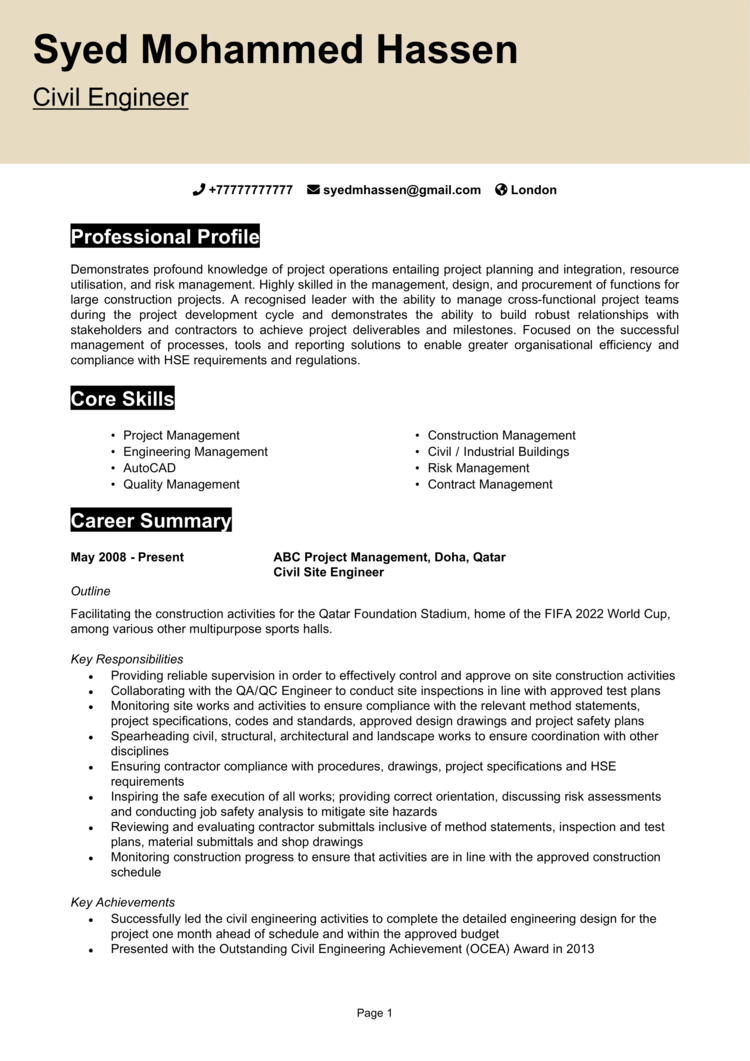
Construction Engineer CV

Bridge Engineer CV
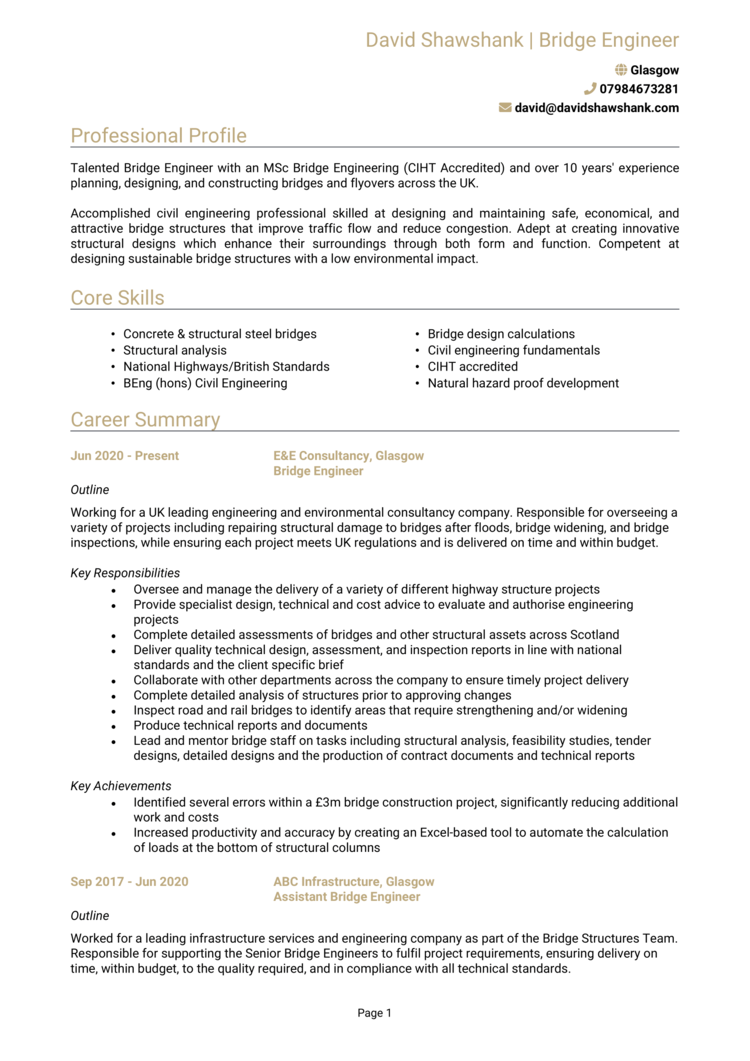
Senior Civil Engineer CV

Civil Engineering Student CV
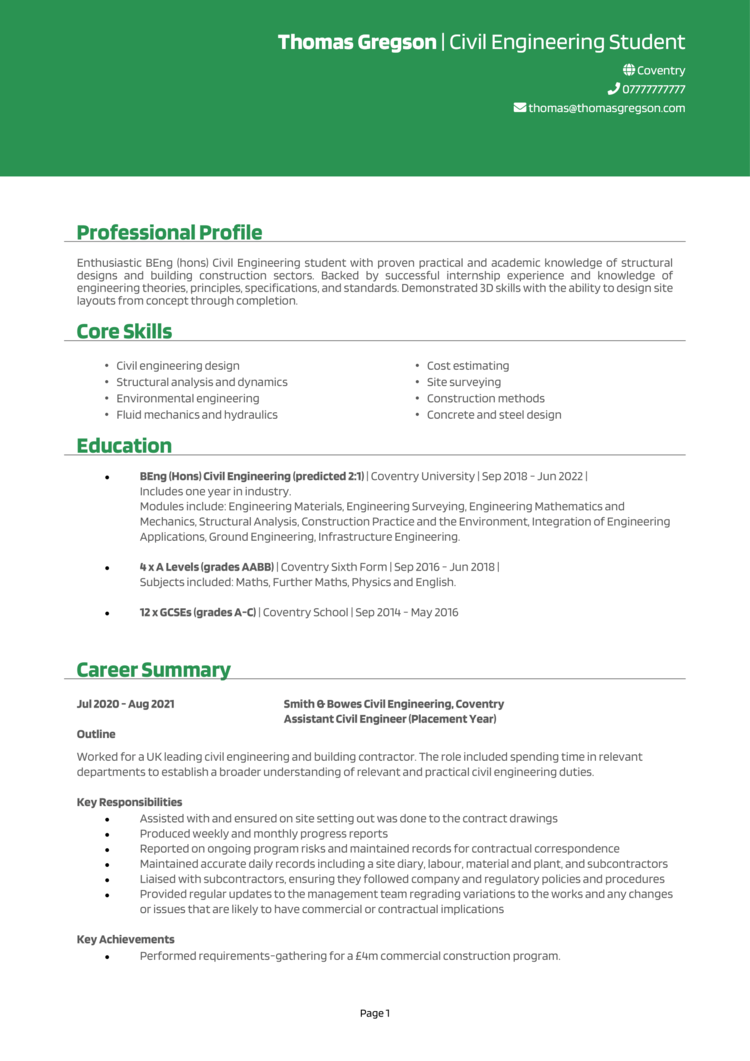
Civil Site Engineer CV
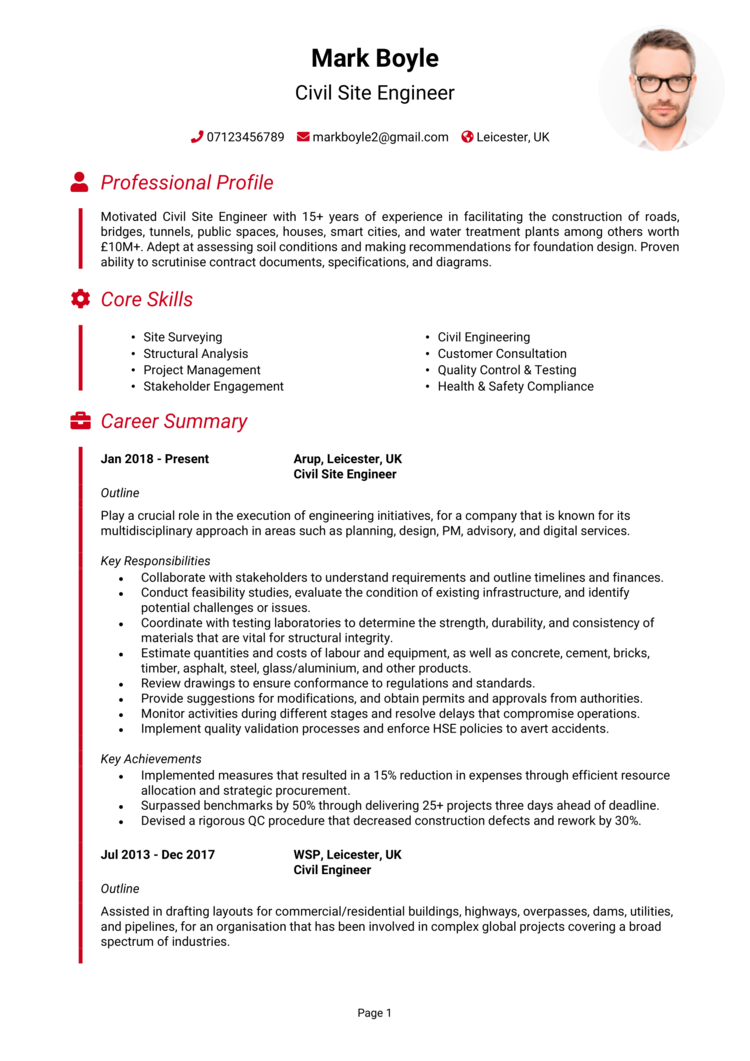
Graduate Civil Engineer CV

Site Engineer CV
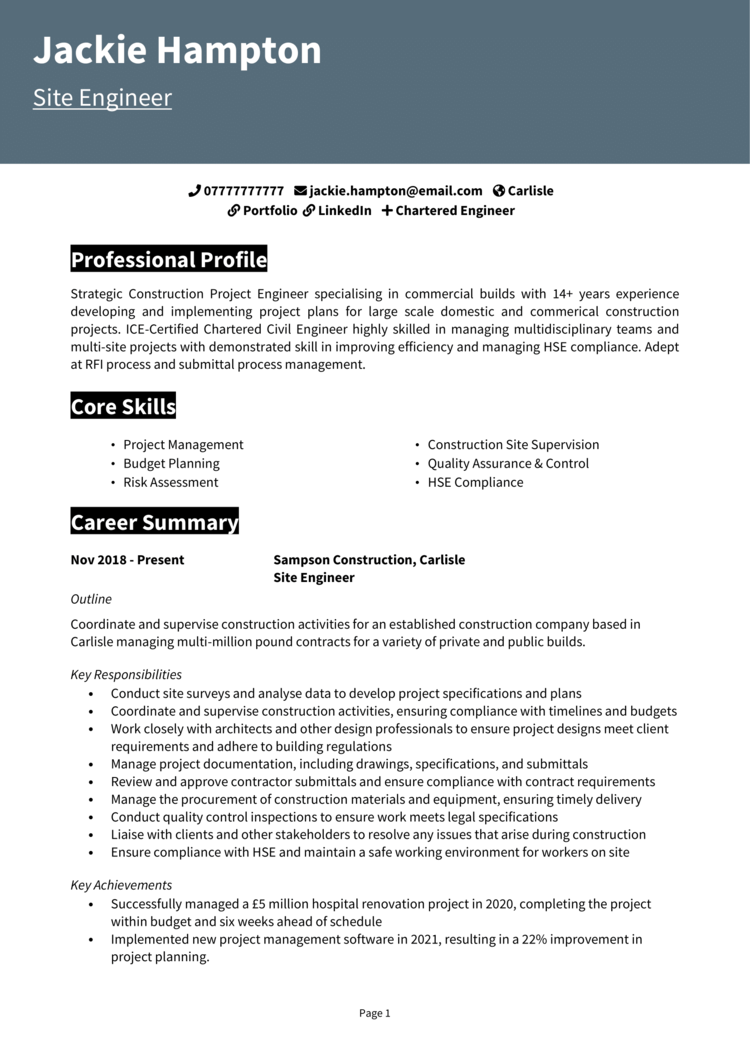
How to write your Civil Engineer CV
Learn how to create your own interview-winning Civil Engineer CV with this simple step-by-step guide.
These steps will walk you through writing a Civil Engineer CV that highlights your technical knowledge, project management expertise, and contributions to successful builds. It’ll give you a CV that ensures you’re at the top of any recruiter’s shortlist.
How should you structure your Civil Engineer CV?


Your CV needs to be as robust and well-organised as the infrastructure projects you work on. Recruiters must quickly see your technical expertise, engineering achievements, and ability to manage complex projects.
Here’s how to structure your Civil Engineer CV:
- Name and contact details – Keep these at the top for quick reference. Photos are optional.
- CV profile – Start off with a concise summary of your engineering experience, key skills, and career highlights.
- Core skills – Next, have a section which lists your key strengths, such as structural analysis, CAD software, and project management.
- Work experience – Detail your roles in reverse chronological order, focusing on responsibilities and measurable results.
- Education – List off your foundational academic qualifications, engineering certifications, and any relevant training.
- Additional info – This section is optional, but it’s good to mention professional memberships, interests, or achievements like industry awards.
Civil Engineer CV format


Your CV format should reflect the precision and professionalism you bring to your engineering work. A poorly presented CV could mean your expertise goes unnoticed, no matter how stellar the content is.
Formatting tips for a Civil Engineer CV:
- Bullet points – Break down tasks and achievements into clear, concise details.
- Divide sections – Use distinct headings for seamless navigation through your work and academic history.
- Use a clean font – Ensure readability with a professional font and layout.
- No more than 2 pages –Two pages is ideal to provide all the essential information while staying concise.
Civil Engineer CV profile


Your CV profile is your chance to summarise your engineering expertise and make a strong first impression. For a Civil Engineer, this section should showcase your ability to design, manage, and deliver projects on time and within budget.
Civil Engineer CV profile examples
Profile 1
Organised Civil Engineer with five years of experience in infrastructure projects, specialising in designing and managing road and bridge construction. Skilled in AutoCAD, SAP2000, and project management tools to deliver projects on time and within budget.
Profile 2
Reliable Civil Engineer with three years of experience in residential and commercial building construction, focusing on structural analysis, material selection, and compliance with safety regulations. Proficient in using STAAD Pro and Revit for structural design and documentation.
Profile 3
Dedicated Civil Engineer with over eight years of experience in water resource management and urban planning. Expertise in hydraulic modelling, drainage systems, and sustainable infrastructure design. Experienced in collaborating with cross-functional teams to implement large-scale projects.
What to include in your Civil Engineer CV profile
Tailor your profile to the role by highlighting relevant project experience, technical skills, and certifications.
Here’s what to include in your Civil Engineer CV profile:
- Where you’ve worked – Say the industries or types of projects you’ve contributed to, such as bridges, roads, or water systems.
- Your top qualifications – Highlight your degrees like a BEng in Civil Engineering and certifications like CEng or IEng status.
- Essential skills – Let the reader know your key expertise in structural analysis, geotechnical engineering, or project management.
- Key projects – Reference high-profile or particularly challenging projects you’ve worked on.
- Stakeholders you’ve worked with – Mention collaboration with contractors, architects, or government agencies.
Presenting your core skills


The core skills section is your opportunity to highlight the technical and project management abilities that make you a great Civil Engineer. Focus on specific skills that are critical for the job you’re applying to.
Skills to include in a Civil Engineer CV
- Structural Analysis – Assessing load-bearing capacities and ensuring stability in designs.
- AutoCAD and Civil 3D Expertise – Proficient in drafting and modelling for infrastructure projects.
- Project Management – Coordinating timelines, budgets, and multidisciplinary teams to deliver projects efficiently.
- Geotechnical Engineering – Analysing soil and rock properties for safe and sustainable construction.
- Hydrology and Drainage Design – Developing effective water management systems for urban and rural areas.
- Construction Supervision – Overseeing on-site activities to ensure adherence to design and safety standards.
- Health and Safety Compliance – Ensuring construction practices meet legal and safety regulations.
- Feasibility Studies – Evaluating project viability and preparing technical reports.
- Material Selection – Identifying cost-effective, sustainable materials for various projects.
- Surveying Techniques – Using GPS and other tools to collect accurate site data.
Work experience


Your work experience section is where you demonstrate your ability to deliver successful engineering projects. It should make up the bulk of your CV, as recruiters will value experience, especially in such an important role.
List your roles in reverse chronological order. If you’re newer to the field, include internships, apprenticeships, or academic projects to demonstrate transferable skills.
How to structure jobs

- Outline – Provide a brief overview of the company, your role, and the type of projects you managed or contributed to.
- Responsibilities – Highlight tasks like designing infrastructure, liaising with stakeholders, or supervising construction. Use action verbs like “developed,” “coordinated,” or “evaluated.”
- Achievements – Include measurable outcomes, such as reduced project costs, improved timelines, or successful completion of high-profile builds. Numbers always impress.
Example work history for a Civil Engineer
Civil Engineer | Iron Gate
Outline
Managed the design and construction of infrastructure projects, including roads and bridges, ensuring alignment with engineering standards and project goals. Collaborated with multidisciplinary teams to deliver successful outcomes.
Responsibilities
- Prepared detailed engineering designs and technical drawings using AutoCAD and SAP2000.
- Conducted site inspections to monitor construction progress and ensure compliance with plans.
- Coordinated with contractors, architects, and local authorities for seamless project execution.
- Performed cost estimation and budgeting for project phases to ensure financial feasibility.
- Ensured adherence to safety regulations and implemented risk management strategies.
Achievements
- Completed a £5M bridge construction project three weeks ahead of schedule.
- Reduced project costs by 15% through effective material selection and waste minimisation.
- Recognised by senior management for delivering consistently high-quality designs.
Structural Engineer | Summit BuildWorks
Outline
Supervised the structural design and construction of residential and commercial buildings, focusing on ensuring safety and functionality. Led teams to complete projects within deadlines and budgets.
Responsibilities
- Developed structural designs using STAAD Pro and Revit to meet project specifications.
- Reviewed and approved construction drawings, ensuring accuracy and compliance.
- Performed load calculations and material testing to guarantee structural integrity.
- Managed contractors and on-site personnel to maintain project timelines.
- Prepared technical reports and documentation for stakeholders and regulatory bodies.
Achievements
- Improved structural efficiency by 20% through optimised design techniques.
- Completed a high-rise residential project under budget by £50,000 without compromising quality.
- Received commendation for ensuring zero safety incidents during the construction phase.
Civil Engineer | Keystone Infrastructure Group
Outline
Designed and implemented water resource management projects, focusing on drainage systems and flood mitigation. Worked with public and private stakeholders to deliver sustainable urban planning solutions.
Responsibilities
- Designed hydraulic models for drainage and irrigation systems using HEC-RAS and EPANET.
- Conducted feasibility studies and environmental impact assessments for infrastructure projects.
- Collaborated with urban planners and environmental specialists to develop sustainable designs.
- Managed project timelines and budgets, ensuring successful completion.
- Monitored construction activities to verify adherence to project specifications and quality standards.
Achievements
- Reduced urban flooding risk by 25% through innovative drainage system designs.
- Secured £1M in funding for a sustainable water management project through a compelling proposal.
- Recognised for delivering a major urban drainage project three months ahead of schedule.
Highlighting your education


The education section highlights the qualifications that underpin your engineering expertise. Include degrees, certifications, and professional development courses that demonstrate your technical knowledge.
List qualifications in reverse chronological order. For newer candidates, emphasise coursework or modules relevant to the job you’re applying for.
Best qualifications for Civil Engineers
- BEng or MEng in Civil Engineering – Provides essential theoretical and practical knowledge.
- CEng (Chartered Engineer) Status – Recognised professional qualification demonstrating advanced expertise.
- IEng (Incorporated Engineer) Status – Focused on practical engineering applications and project delivery.
- NEBOSH Construction Certificate – Validates knowledge of health and safety practices in construction.
- AutoDesk Certified User: AutoCAD Civil 3D – Demonstrates proficiency in drafting and modelling software.


